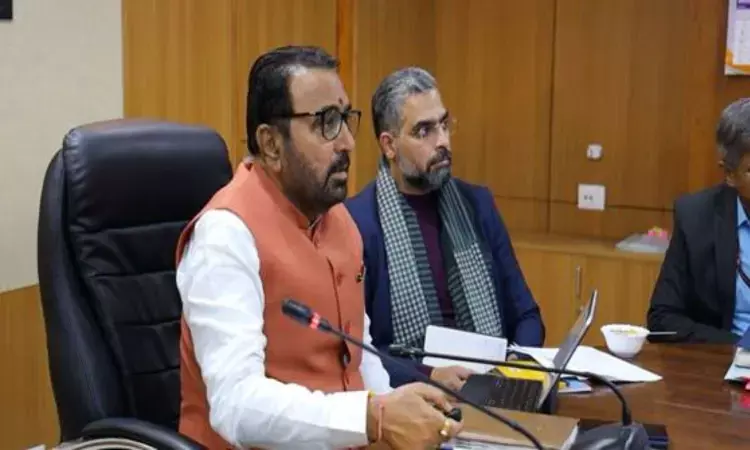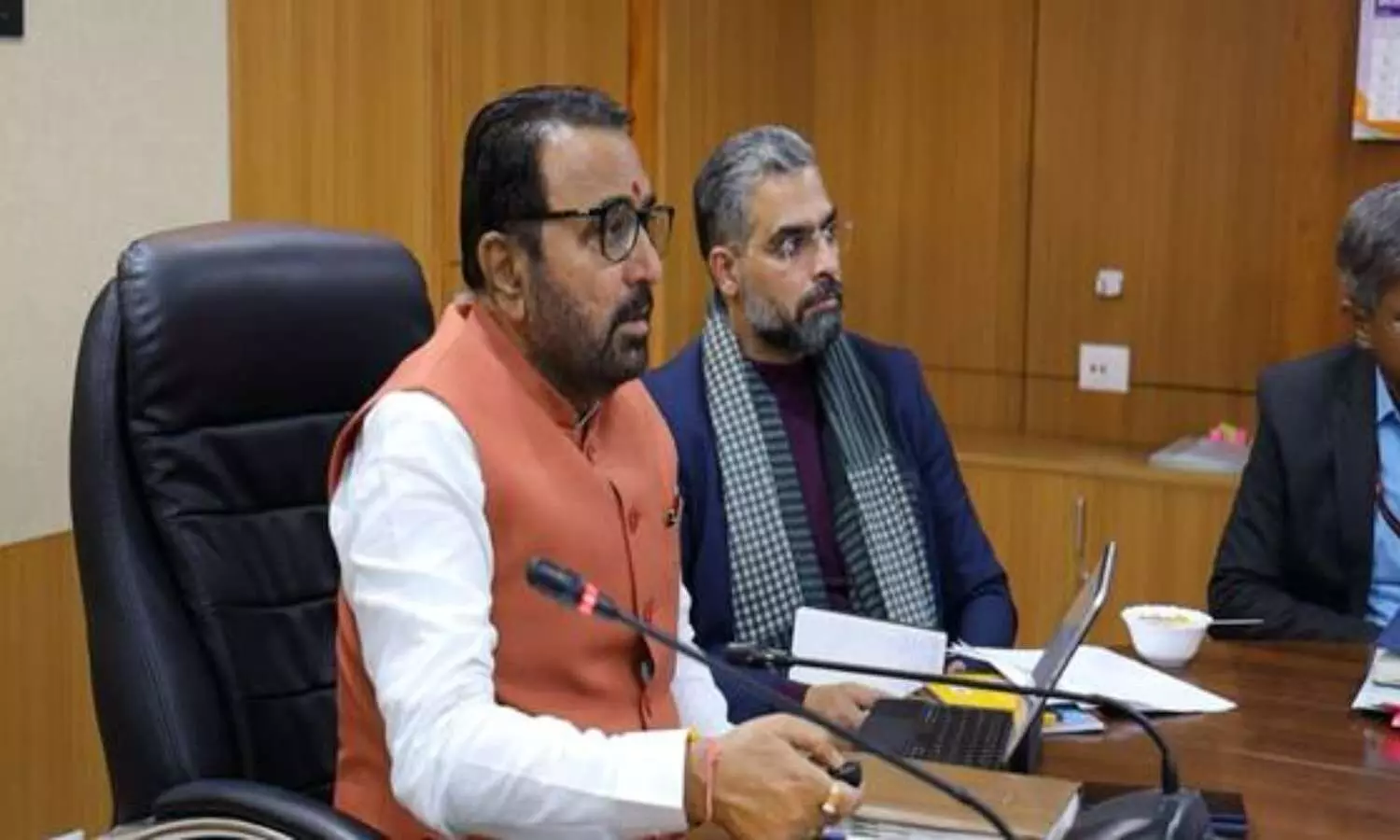- Home
- Medical news & Guidelines
- Anesthesiology
- Cardiology and CTVS
- Critical Care
- Dentistry
- Dermatology
- Diabetes and Endocrinology
- ENT
- Gastroenterology
- Medicine
- Nephrology
- Neurology
- Obstretics-Gynaecology
- Oncology
- Ophthalmology
- Orthopaedics
- Pediatrics-Neonatology
- Psychiatry
- Pulmonology
- Radiology
- Surgery
- Urology
- Laboratory Medicine
- Diet
- Nursing
- Paramedical
- Physiotherapy
- Health news
- Fact Check
- Bone Health Fact Check
- Brain Health Fact Check
- Cancer Related Fact Check
- Child Care Fact Check
- Dental and oral health fact check
- Diabetes and metabolic health fact check
- Diet and Nutrition Fact Check
- Eye and ENT Care Fact Check
- Fitness fact check
- Gut health fact check
- Heart health fact check
- Kidney health fact check
- Medical education fact check
- Men's health fact check
- Respiratory fact check
- Skin and hair care fact check
- Vaccine and Immunization fact check
- Women's health fact check
- AYUSH
- State News
- Andaman and Nicobar Islands
- Andhra Pradesh
- Arunachal Pradesh
- Assam
- Bihar
- Chandigarh
- Chattisgarh
- Dadra and Nagar Haveli
- Daman and Diu
- Delhi
- Goa
- Gujarat
- Haryana
- Himachal Pradesh
- Jammu & Kashmir
- Jharkhand
- Karnataka
- Kerala
- Ladakh
- Lakshadweep
- Madhya Pradesh
- Maharashtra
- Manipur
- Meghalaya
- Mizoram
- Nagaland
- Odisha
- Puducherry
- Punjab
- Rajasthan
- Sikkim
- Tamil Nadu
- Telangana
- Tripura
- Uttar Pradesh
- Uttrakhand
- West Bengal
- Medical Education
- Industry
Health Minister details Cancer Prevention, Screening Initiatives amid Rising cases

MoS Health Prataprao Jadhav Highlights India’s Rising Investment in the Health Sector
New Delhi: The Ministry of Health and Family Welfare has launched the Non-Communicable Diseases (NCD) Screening Campaign from 20th February, 2025, to 31st March 2025 to achieve universal screening of individuals aged 30 years and above, informed Shri Prataprao Jadhav, the Minister of State for Health and Family Welfare.
The minister was addressing the questions raised by Shri Tangella Uday Srinivas during a recent Lok Sabha session. Sri Srinivas asked whether the Government has compiled data on cancer incidence in the country during the last five years, while seeking the details of the number of reported cases annually. He also inquired whether the Government has conducted research to assess the major causes contributing to the rising incidence of different types of cancer and has analyzed regional variations in cancer incidence and its correlation with socio-economic and environmental factors.
He also sought details of the funds allocated and utilized for cancer research, treatment infrastructure, and awareness programmes during the last five years. He further asked whether the Government plans to initiate targeted preventive measures, early detection programmes/policy interventions to curb the rising trend of cancer cases in the country.
While addressing the questions, Shri Prataprao Jadhav stated that as per the Indian Council of Medical Research (ICMR)- National Cancer Registry Programme (NCRP), the estimated number of incidents of all types of cancer cases in the country in 2024 is 1533055 and 1392179 in 2020. As informed by Indian Council of Medical Research (ICMR), the reasons for increase in number of cancer cases reported is due to access and availability of improved diagnostic techniques for detection of cancer, increased life expectancy, growing share of geriatric population, higher health consciousness and improved health seeking behaviour, stated the minister.
As per the Indian Council of Medical Research (ICMR) - National Cancer Registry Programme (ICMR-NCRP) data, there is heterogeneity/ regional variation in cancer incidence (Age- Adjusted Incidence rate (per 100,000): males: Osmanabad and Beed, 39.5 vs Aizawl district, 269.4; females: Osmanabad and Beed, 49.4 vs Papumpare district, 219.8) across India. The Indian Government, through various studies and organizations like the Global Burden of Disease Study, has analyzed regional variations in cancer incidence, revealing correlations with socioeconomic and environmental factors, including higher cancer rates in rural areas, specific cancer types, and the impact of risk factors like tobacco use and environmental pollutants. The North-Eastern (NE) region has the highest incidence of cancer in India, and is also burdened by higher prevalence of risk factors and inadequate cancer treatment facilities. Studies show higher cancer incidence rates in urban areas compared to rural areas, with some exceptions, like tobacco-related cancers being more prevalent in rural areas.
Indian Council of Medical Research (ICMR) is funding research in areas of gall bladder cancer, breast cancer, lung cancers, cancers in North-east and oral cancers through its centrally sponsored research projects, and 300 crore was earmarked for the same in 2023-24. The Department of Health and Family Welfare provides technical and financial support to States and Union Territories across the country under the National Programme for Prevention and Control of Non-Communicable Diseases (NP-NCD) as part of the National Health Mission (NHM). Under the programme, 770 District NCD Clinics, 372 District Day Care Centres, and 6410 NCD Clinics at Community Health Centres have been set up.
Furthermore, the Preventive aspect of Cancer is strengthened under Comprehensive Primary Health Care through Ayushman Aarogya Mandir by the promotion of wellness activities and targeted communication at the community level. Under NP-NCD, financial support of Rs. 3 -5 lakhs at the District level and Rs. 50-70 lakhs at the State level is provided under the National Health Mission for awareness generation activities for NCDs to be undertaken by the States and Union Territories as per their Programme Implementation Plans (PIPs).
The Government of India has implemented the ‘Strengthening of Tertiary Care Cancer Facilities Scheme since 2014 under the National Programme for Prevention and Control of Non-Communicable Diseases (NP-NCD) for setting up 19 State Cancer Institutes (SCI) and 20 Tertiary Care Cancer Centres. The financial assistance is provided for the procurement of radiotherapy equipment, diagnostic equipment, surgical equipment, enhancement of indoor civil work, and patient facility for cancer and such other purposes relevant for diagnosis, treatment, and care of cancer. The maximum permissible assistance for SCI is Rs. 120 crores and for TCCC Rs. 45 crores, the Minister added.
Sanchari Chattopadhyay has pursued her M.A in English and Culture Studies from the University of Burdwan, West Bengal. She likes observing cultural specificities and exploring new places.




